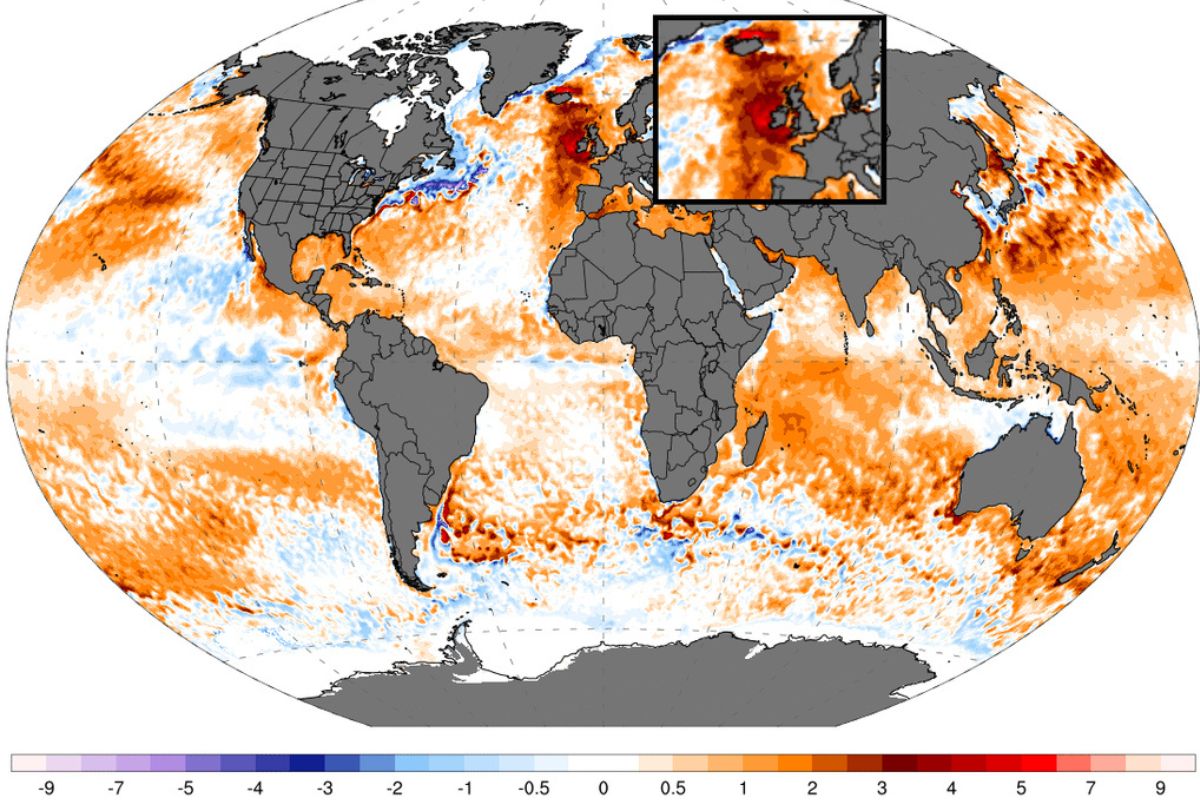Show table of content Hide table of content
British waters are experiencing an unprecedented marine heatwave this spring, with sea surface temperatures soaring to levels typically seen in mid-June. This extraordinary warming event, now extending beyond two months, demonstrates both remarkable intensity and persistence across the waters surrounding the UK. The phenomenon has caught the attention of meteorologists and marine scientists who are tracking its development and potential impacts on marine ecosystems.
Understanding the record-breaking marine heatwave
The current marine heatwave affecting British waters represents an anomalous warming pattern of historic proportions. Sea temperatures around the west of Ireland have climbed to nearly 4°C above normal levels, while coastal waters around Britain show increases between 1.5°C and 2.5°C above seasonal averages. These dramatic temperature spikes began in mid-February 2025, approximately one month earlier than typical seasonal warming patterns would suggest.
Marine heatwaves create distinct thermal layering in ocean waters, comparable to olive oil floating atop water. This thin surface layer traps heat near the ocean’s surface, preventing it from mixing with cooler waters below. The Met Office has recorded rapid temperature increases under these conditions, including a sudden 1°C rise over just nine days in May. Such thermal stratification can significantly amplify the warming effect and prolong the heatwave’s duration.
While normal marine heatwaves in British waters typically last between two and four weeks, the current event has maintained its intensity since early March. This extended duration makes it one of the longest spring marine heatwaves in recorded history. Jonathan Tinker, a marine climatologist, warns that such events may become more common as global climate patterns continue shifting dramatically, with projections suggesting summer sea temperatures around the UK could rise by 2.5°C by 2050.
Key factors driving the extraordinary warming
Several overlapping factors have contributed to this exceptional marine heatwave. Persistent high-pressure systems have delivered an unusually dry and sunny spring across the British Isles. These atmospheric conditions have combined with minimal wind activity and reduced wave action to create ideal conditions for rapid ocean warming. The calm seas have allowed solar radiation to penetrate and accumulate heat in surface waters with little disruption.
The baseline temperature of waters surrounding the United Kingdom was already elevated following an unusually warm winter. This continues a troubling warming trend observed over the past four decades, with average sea temperature increases of approximately 0.3°C per decade in British waters. This background warming provided the foundation upon which the current heatwave could develop with such intensity.
Different regions around the British Isles have experienced varying levels of warming. The North Sea reached its maximum temperature early in the event, while waters west of Ireland and the Celtic Sea are currently experiencing their peak temperatures. These regional variations reflect the complex interplay of ocean currents, atmospheric conditions, and topographical influences that characterize marine heatwaves in the region. Swimmers venturing into British waters should be aware of these unusually warm conditions and potential ecological changes, including possible increases in certain marine organisms like jellyfish populations that thrive in warmer temperatures.
Science This strange red lake in Tanzania turns animals to ‘stone’.
Monitoring ecological impacts and future prospects
The Centre for Environment, Fisheries and Aquaculture Science (CEFAS), Plymouth Marine Laboratory (PML), and the National Oceanography Centre (NOC) are actively monitoring this marine heatwave’s effects on marine ecosystems and fisheries. Prolonged warming can significantly disrupt marine biodiversity, potentially affecting fish migrations, spawning patterns, and the distribution of various marine species. These changes could have cascading effects throughout the food web and impact commercial fisheries that rely on predictable species distribution.
Weather forecasts for late May indicate some relief may be on the horizon. The weekend of May 24-25, 2025, is expected to bring cooler temperatures and stronger westerly winds to the region. These changing atmospheric conditions could help break down the stable surface layer that has been trapping heat, allowing cooler water to mix with the warmed surface waters. This mixing process would gradually reduce sea surface temperatures toward more normal seasonal levels.
Marine scientists have noted that these extreme warming events provide valuable insights into how changing ocean conditions might influence future weather patterns. The warming seas can amplify terrestrial heat waves by reducing the cooling effect of sea breezes and altering precipitation patterns. Understanding these marine-atmospheric interactions helps improve climate models and weather predictions. Researchers have also documented how marine heatwaves affect rare fish species and their distribution patterns, providing further evidence of ecosystem shifts.
Adapting to warming waters
As marine heatwaves become more frequent and intense, coastal communities around Britain may need to adapt to new realities. The fishing industry could face significant challenges as traditional catch species shift their ranges in response to warming waters. Tourism patterns might also change, with extended swimming seasons potentially benefiting coastal economies while creating new safety considerations for beachgoers.
Public health officials recommend that people engaging in water activities stay informed about changing marine conditions. While warmer waters might seem appealing for swimming, they can also support harmful algal blooms and increase the presence of certain marine pathogens. Health experts suggest that maintaining physical fitness through regular exercise helps build resilience to environmental stressors, including those associated with changing climate conditions.
As this record-breaking marine heatwave continues to affect British waters, it serves as a powerful reminder of our oceans’ changing nature and the importance of comprehensive monitoring systems. The data collected during this event will provide valuable insights for understanding and predicting future marine heatwaves, helping communities and ecosystems adapt to our warming world.


